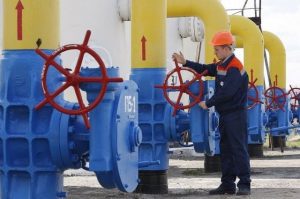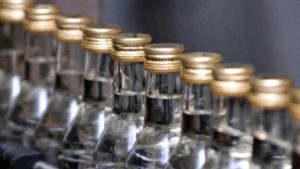
PrJSC Severodonetsk Azot, part of the group of nitrogen business enterprises Group DF, is preparing to produce oxygen for medical use and has already submitted the necessary documentation package to the State Expert Center of the Ministry of Health.
“All organizational issues related to permits must be resolved as quickly as possible. The region has a difficult epidemic situation with COVID-19,” the Group DF said in a Tuesday press release, quoting Board Chairman of Severodonetsk Azot Leonid Buhaev from a working meeting with Head of the Luhansk Regional Administration Serhiy Haidai.
The company said that it has already received a license from the State Service of Ukraine on Medicines and Drug Control for the production and sale of oxygen for medical use.
According to the release, the production capacity of the air separation workshop is 500 cubic meters of oxygen for medical use per hour. According to Haidai, with the resumption of production of medical oxygen at Azot, the region will be fully provided with the necessary number of cylinders for the treatment of seriously ill patients with COVID-19.
Severodonetsk Azot is one of the largest Ukrainian chemical enterprises. It has been part of Dmytro Firtash’s Group DF since 2011. The core business of the enterprise is the production of mineral nitrogen fertilizers.

Chateau Chizay Winemaking Company LLC (Berehove, Zakarpattia region) plans to start producing sparkling wine, brandy and cognacs.
Investments in the launch of the last two products will amount to about $ 2 million, Hennadiy Hutman, the owner and founder of Chateau Chizay, said.
“We are planning to produce brandy and cognac. Now we are designing an alcohol storage facility for 63,000 dal. This will be a completely new line and a new direction in Chateau Chizay. Construction is planned at our primary wine-making plant, where grapes are processed. We also plan to produce sparkling wine that is another new direction for us. The target price of the project for brandy and cognac is approximately $ 2 million,” he said in an interview with Interfax-Ukraine.
Under favorable conditions, the company plans to launch the production of brandy and cognac in January-February, sparkling wine in 2021.
Answering the question about the impact of the pandemic on the sales of Chateau Chizay wines, the owner of the company noted that sales fell by 50% in the spring 2020 compared to the spring 2019.
“Now the market is reviving, but the uncertainty of the situation with the coronavirus is scary. If in the first months of the pandemic the fall was 50-55%, then since August there has been an increase, now there will be a decline again,” Hutman said.
Despite COVID-19, the winemaking company continued to open up new markets for its products, so in 2020 Chateau Chizay began delivery to Britain, Denmark, and signed a delivery contract with Japan, Norway and Mexico.
“Now we are preparing a small delivery, but it is still very interesting, to one of the wine-making regions, Hungary. We have been delivering our wines to the United States, Canada, Israel, and Australia for several years. This year we have shipped 50,000 liters of wine to Kyrgyzstan, this is a good and interesting market,” the founder of the company mentioned

The association Gas Traders of Ukraine, uniting over 30 energy traders, has initiated the launch of a new platform for electronic exchange trading in energy on the Ukrainian Hub commodity exchange, although recently the Ukrainian Energy Exchange has been actively increasing trading volumes.
“At the Ukrainian Hub commodity exchange it is planned to hold tenders for the natural gas, liquefied gas and oil products,” the association said in a release on Tuesday.
According to the public register, Ukrainian Hub commodity exchange LLC was created with a charter capital of UAH 10,000 at the end of August 2020. Its founders on a parity basis were Central Gas and Oil Company LLC (Kyiv) belonged to Roman Storozhev and Ver-Tas LLC (Karlivka, Poltava region) belonged to director Oleksandr Mariukhnich, and the head of the company is Maryna Mariukhnich.
In 2002-2004, Storozhev was Director General of Ukrzakorodonggeologia, then until 2013 he was President of the Association of Subsoil Users of Ukraine, in 2013 he became Deputy Head of the NJSC Nadra Ukrainy, and from the end of that year until May 2014 – he was Head of the State Service of Geology and Subsoil of Ukraine.
Mariukhnich is Director of the Agrarian Exchange, which currently, according to its website, regularly holds auctions for the sale of the property of Nadra Ukrainy.

The Ministry of Economic Development, Trade and Agriculture of Ukraine has initiated an unscheduled internal audit of the state enterprise Ukrliktravy, the ministry reported on its website on Monday, October 26.
“On the basis of an official investigation, information about the unsatisfactory financial and economic condition of the enterprise, as well as in connection with the improper performance of his official duties, head of the state enterprise Ukrliktravy Andriy Vlasenko was dismissed,” the report says.
The total tax debt of the enterprise exceeds UAH 12 million, all accounts are blocked, the ministry added.
“As of October 26, 2020, the company has not submitted reports to the tax authorities for VAT and single social security tax,” the Ministry of Economic Development, Trade and Agriculture said.
The state enterprise did not submit financial plans for 2020 and 2021, which is a gross violation. In addition, there is no reporting for the second quarter and the first half of this year, the ministry said.
“Also, during the inspections, it was revealed that the company is not actually located at the legal address. There is no staff (there is no legal, financial, personnel and other services). Along with this, there is the urgent problem of harvesting maize and soybeans, which due to weather conditions remain unharvest and carrying out a complex of autumn field work,” the ministry added.

The state-owned enterprise Ukrspyrt increased net profit 1.6 times, up to UAH 28.1 million, in January-September 2020 compared to the same period last year.
According to acting director of the state-owned enterprise Ukrspyrt Serhiy Bleskun, alcohol production increased by 19.6% up to 4.72 million decaliters in the nine months this year.
“We have a great trend since 2019, but the pace in the third quarter has slowed down. This was influenced by such objective factors as demonopolization (since July 1, buyers can buy alcohol from other state-owned producers) and the rise in the price for raw materials such as maize and wheat. This led to deterioration in profitability in the third quarter,” Bleskun wrote.
He also noted that over the past two weeks, the State Property Fund (SPF) has privatized three objects of the state-owned enterprise Ukrspyrt totaling almost UAH 160 million.
As reported, President of Ukraine Volodymyr Zelensky on December 11, 2019 signed a law on the abolition of state monopoly on alcohol production from July 1, 2020, adopted by the Verkhovna Rada on December 3, 2019.
The State Property Fund expects to attract about UAH 2 billion from the privatization of alcohol producers of the state-owned enterprise Ukrspyrt and the concern Ukrspyrt. The first auction is scheduled for October 15, 2020.

The Ukrainian Agribusiness Club (UCAB) has revised downward the forecast for the corn harvest this year from 32 million tonnes to 29.4-29.5 million tonnes under the optimistic scenario due to unfavorable weather conditions during July-August, and also taking into account the situation with harvesting in September and October in a number of regions of Ukraine.
According to a message from UCAB on Wednesday on Facebook, about 13 million tonnes of corn have already been harvested with an average yield of 5.18 tonnes per ha, in some regions corn has already been harvested from more than 50% of the sown area.
“Usually, farmers start harvesting first from less productive fields, so there is some hope, as well as statistical confirmation from the example of last year, when at the end of the harvest, the yield increases slightly. By the end of field work, according to optimistic forecasts, an average yield of 5.75 tonnes per ha is expected,” UCAB said.
According to the Ukrainian Agribusiness Club, unfavorable conditions have developed almost throughout the entire territory of Ukraine, however, the greatest reduction in the expected yield occurred in Cherkasy, Vinnytsia, Poltava, Kirovohrad and a number of southern regions. As a result of dry conditions and a lack of moisture in the soil, premature drying and maturation of plants is observed. During field surveys, insufficient fullness and relatively small sizes of corn ears are often detected.
UCAB’s expectations for the sunflower harvest have been reduced to 12.2 million tonnes from the forecast of 13.6 million tonnes in early September. According to calculations, the average yield is 2.2 tonnes per ha. The largest decline was due to the southern regions, where the production of this oilseed is focused, as well as the central ones.
According to UCAB, soybeans also suffered significantly from unfavorable conditions, so its gross yield is expected to be only 2.7 million tonnes, which is 30% less than last year. This significant decrease occurred, among other things, due to a decrease in the area under crops from 1.6 to 1.3 million hectares.